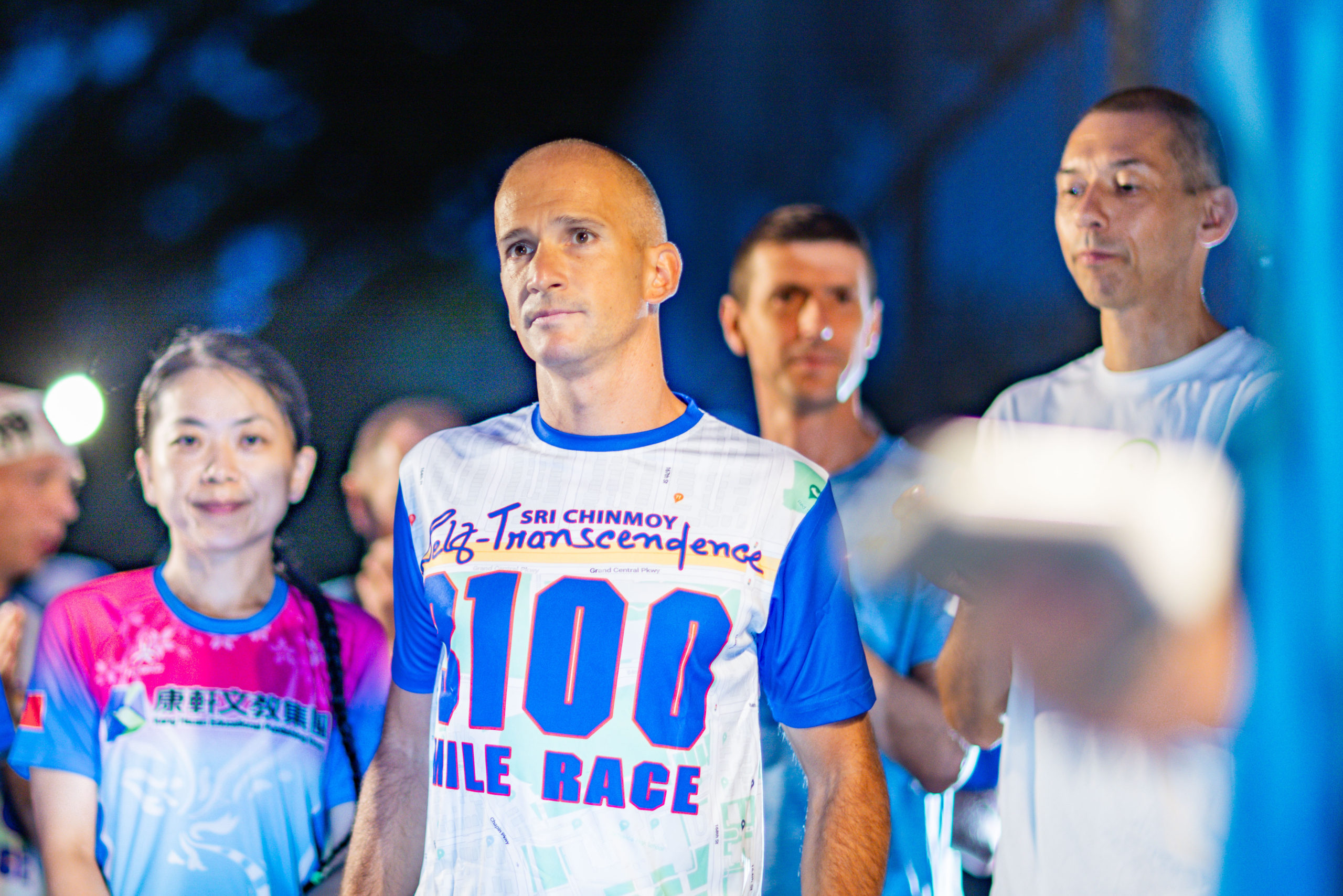I caught up with 3,100 mile champion,Andrea Marcato. He recently won the Sri Chinmoy 3,100 mile race in New York for the fourth time. He talks about his junior life as a budding international swimmer, and what the race means to him.
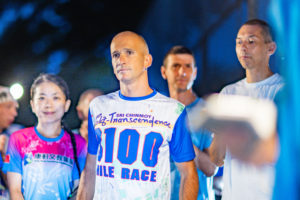
3,100 mile Champion Andrea Marcato
RAS (Runners are Smilers). So, I am talking with Andrea Mercato, who has just had his fourth victory in the recent Sri Chinmoy 3100-mile race. Congratulations on your victory.
AM. (Andrea Marcato.) Thank you so much.
RAS. Briefly, for people who don’t know you, fill us in on your background. Did you do any sport at school and how did your sporting life develop?
Early sporting life as a swimmer.
AM. Yes, I started swimming as a kid. I was four years old, and my parents sent me to the local swimming pool, and that started my career in a way. I was a semi-professional swimmer till the age of 16, and then I stopped to study, and that was it.
RAS After studying, or during studying, did you do any exercise, or did you forget about exercise and have fun at university?
AM. No, I kept going. I was playing
football, like soccer, I mean in Europe, we call it soccer. I played with a local team, at a local level. It was nothing too serious. Not the major league or something similar. It was just for fun, but still, I kept going, for a couple of years or three years, I would say.
RAS. What level did you reach when you were swimming, in terms of Italian standards? Was it at the regional level? Were you in the national squads or something?
AM. Yes, I was. Several times, I won the regional league which meant I was among the top 10 or 15 swimmers in Italy in my age group, but that was only for the junior category. You could say I was relatively good.
RAS Did you take your swimming to a senior level?
AM No, unfortunately not. That is a big regret I have. I actually know five Olympians who made it somehow from our local area. I was competing with them, so we were kind of friends. They went on, and I was almost at the same level, but actually, my big mistake was that I dropped swimming somehow. I didn’t continue. I was already slightly overwhelmed because I was training twice a day. Even at a young age, it was already, almost a professional approach. I would say it’s difficult when you are a teenager. It’s very stressful when you see your peers enjoying life and doing something else. You struggle a little bit.
RAS How did you get into running, and more
specifically, ultra-distance running as the years progressed?
AM, As I said, I stopped swimming at age 16 and had a few years gap. I was playing soccer. I am from Venice, but I went to university in Padova. In Padova, I started thinking more deeply about my philosophy on life, and I was looking for something deeper. I felt some kind of meditation, or some way to calm the mind, would also help me study better and help me perform better in life, in general. I heard about Sri Chinmoy’s philosophy, and I was happy to see that meditation and the spiritual life in general, could go hand in hand with the sporting life.
So I started to run. I started to run, and Sri Chinmoy inspired us to run at least two miles a day. From that very little beginning, I started to do more and more, and more. I think the discipline reminded me of my previous sports life, and I could handle a big load of training.
First ultra race.
I did my first ultra-distance race already at the age of 20, which was quite early.
RAS, What distance was that?
AM It was a 12-hour race in Basel, Switzerland.
RAS.Over the years, you have run many 6-hour, 12-hour and24 hour races. When did the 3100 first come on your radar?
AM. I have had almost a 20-year career if you want to call it that. I was racing many times in 6-hour races, 12-hour races, and 24-hour races. I qualified as a member of the Italian national team for the 24-hour race in 2015. Later on, I started to think about the bigger picture somehow, so I entered the world of multi-day events. My first multi-day race was a 6-day race in New York, in Flushing Meadows, and to be honest, I was not even thinking about the 3100-mile race. I knew it existed, but I wanted to do better in the 6-day and 10-day races. Then, it was a natural evolution in some way. I did two 10-day races in a row. I ran a good 10-day race, running more than 620 miles, which is over the minimum requirement to qualify for the 3100.
After I ran that good 10-day race the organizers asked me, ” Do you think about the 3100 mile race? What is your opinion and so on? At first, I was a little bit scared, I have to say, about this huge distance, but then later on, I said, “Okay. Every year I am improving. I am running more and more and increasing the distance, so I thought, “Why not?”
RAS. When you were younger as a swimmer, you were very competitive, and as a runner, that competitiveness never leaves you. How do you reconcile that with getting involved in meditation and trying to calm yourself? Can the two be reconciled? Can you still be calm and in the moment while still being competitive?
AM Oh yes! I mean, meditation is a very powerful instrument. I have to say I cannot compare my swimming life with my ultra-distance life in a way because swimming was a real, I would say, professional approach. I have a regular job, but I still try to put in a lot of effort, and I see the results.
RAS. Since you started running ultra marathons seriously, you made the Italian 24-hour squad. You must have been training fairly hard to get to that level. Transitioning to multi-days, have you adopted a different approach to training? Do you have any structured training, or are you quite spontaneous?
How does it work out each month?
AM. I always had a spontaneous approach somehow. When I was swimming as a teenager, I put a lot of pressure on myself. With a coach, you have to perform in a certain way. If you don’t perform, you are out. In my running career, I took a much simpler approach.
I mean, I was more careful not to put too much pressure on myself. At the same time, I was doing a lot, so I would say I didn’t put in the hundred per cent effort as in my youth, but I would say 80% effort, and that approach is exactly what made me successful.
Sometimes, too much training isn’t necessarily better. That was my own experience. I was trying to be more balanced in my life. With meditation, you get a kind of peace and inner poise that allows you to feel your body and the limits of your body. I was careful to stay within certain limits. That has allowed me to progress, but not to overdo it in the way I think I did with swimming when I was younger.
The Ultimate Coach.
RAS. A You talked about having a coach in your swimming life. Have you ever thought about getting a coach in your running life, or do you just get advice from various people as you’ve gone along?
AM. Officially, I never thought about having a running coach. It happened quite naturally, in a way. Arpan was my helper at this year’s race. He’s a kind of, how can I say, a friend for many years, and naturally, spontaneously, we create this kind of relationship of athlete and coach. We can call it like this, and I follow his advice. He did this race twice, so he was one of the first American runners who completed the race at age 52. Arpan has a lot of experience in multi-day events, so in a way, I could say he is my coach. Ultimately, I try to go deep within and, how can I say, listen to what my body is telling me. The ultimate coach is within me, so I try to listen and feel from within what is coming.
RAS That is all good information. You finally got to the point where you almost crossed the bridge, and you saw the 3100 as possible. That is still a huge leap of faith, transitioning from 10 days to maybe 50 days. Five times as much running and five times as much time on your feet in duration. How do you cope with this? Is coming to terms with that more of a mental challenge, or is it too much for the mind? Do you have to go beyond the mind to grasp the concept?
AM Yes, absolutely! You have to. In spiritual terms, you use this word like surrender. You must have faith that everything will turn out for the better.
At the same time, I was really conscious of my strengths and capacity. You have to prepare, not just the body but your mind and emotions, to cope with the distance. I remember running very long training runs like over 12 hours of solo training. It’s the kind of achievement that helps a lot somehow. How can I say? Running 12 hours during an event is, in some ways, easy because you have all the support provided. When you can do it alone in your own training and run for 12 or 15 hours, or even more, then you are infinitely more skilful as a runner, and you develop much more. I had strong faith in my own capabilities.
RAS. You first did the 3,100 in 2020, in Salzburg. Other runners I’ve talked to about the 3100 say that there comes a point, maybe two weeks in, maybe three weeks in, where you reach a point when it is “make your mind up time.” You’ve been running for two or three weeks, and everything is starting to settle down. The first week is easy. You’re warming up, and then you still see this huge distance in front of you. It’s almost like your mind is saying, “This is too much. I don’t think I can do this!” Did you ever have that feeling?
AM Of course, Yes. It’s like you are in the middle of the ocean and you feel completely lost. You are crossing the ocean, and you start. You are there, and at a certain point, you know you are in the middle. You can’t go back anymore, and you don’t see the goal, the final goal. So you feel a little bit lost. I went through all these kinds of experiences, but luckily, I knew it was more a mental challenge rather than a physical one. In my case, I knew I was well-trained. So I knew it was just a matter of mastering the mental game, and not allowing your mind to take over somehow. You have to feel everything will be alright.
On the Start line of the 2023 race
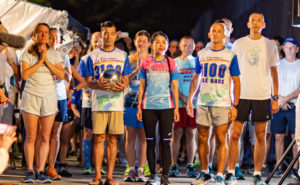
RAS. You are standing on the start line of this year’s race on August 30th. What is going through your head on that start line? Anything?
AM Oh wow, yes, this year was a special year for me.
I was running the most in my whole career. I was running a lot. I’m talking about thousands of kilometres. At the end of the year, if include this race, I will have run about 10,000 kilometres, even 12,000. It’s a massive, massive approach. I was a little scared that I was running too much. This year, I said to myself, “OK. Something could go wrong. I won’t blame myself, but I did so much that there was the possibility that something could go wrong. For the first three years, I ran the race, I was really confident. This year, I said, “OK. Maybe something could happen. It was an option, but I was still super happy with my preparation and my performance.
RAS How did the race evolve for you? Was it different from other years? People forget that you are running 60-70 miles a day, every day. As the race progresses, How do you cope with that distance every day?
AM. My average daily mileage was 71 this year. I was happy because I ran very strongly the first week.
I beat my record at the 10-day point and the 1000-mile, so I still hold the Italian national record. Previously, it was still my record, but I did better this year so I was super happy for my start in the 3,100. Unconsciously, I wanted to have this kind of approach because often during my 10-day races, some runners started strongly. They built a lead, and although I was strong in the final days, I couldn’t close the gap before the end of the race.
I decided from the start of the 3100 this year, also to have this kind of approach. Start strong and then try to defend until the end. I did what I wanted to do, and only the last part of the race was a little bit difficult and I was wondering if I would hold on.
RAS Yes. Arpan told me that there was one point where you were asking if Wei-Ming, the second-place runner, could catch you. I mean, you are so far ahead, but even though you’re trying to be in the moment and surrender to everything, you still have that little competitive feeling that want to win.
AM Yes I do. In ultra-distance races, especially in such a long distance, several things can definitely go wrong, and you can easily lose. If you miss just one day, which in my case never happened, but I know other runners, they feel ill one day, and they cannot run, or they get a minor injury or whatever. If you miss a day, you could lose 70 miles. The gap was indeed huge, but somehow, anything can happen. I knew somehow unconsciously that I had it in a way, but the mind, especially in this kind of setting, tends to agonize about minor things and worry because you put a lot of effort in, and you don’t want to see it wasted.
RAS And as the race progresses, you see the leaderboard and numbers going up on it, and the daily mileage. Do you think about the numbers, or are you just thinking, let’s get through another day?
AM. Normally I try to think day by day. I have my daily goal. Let’s say 70 miles or a little more. Normally I don’t think ahead, but this year, in the last week, I really just wanted and needed only one thing, the finish line. In a way, it was a little bit stressful for my mind, and I was making a lot of calculations and so on.
RAS. As a runner, you didn’t do your fastest time this year, even though coming into the race, from what you’re saying, you might have had that as a goal.
AM.Yes.
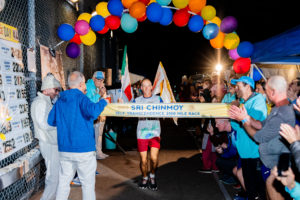
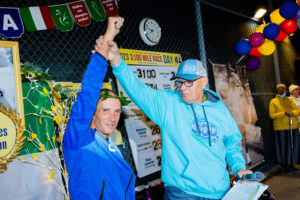
RAS Sadly, you didn’t get your goal of beating your previous best time. Are you just happy with what you did achieve?
AM I’m super happy, simply because I tried a different approach. I normally start easy. Then I try to improve as long as the race goes on. I try to improve my split. So, for example, in my first race in Salzburg and my second race in 2021, I had what I call the perfect race. My first thousand miles felt good. My second thousand miles was better than my first thousand miles, and my third thousand was even better than the second thousand miles. So it was not an even race but was progressively faster somehow. I was doing better and better and better, and I had this grand finale at the end that I was really doing very well, like 77 miles a day or something like that. This year, I opted for another approach, so I wanted to have a powerful start, and of course, I knew that I couldn’t keep this intensity the whole race. I wanted to defend a lead in a way.
RAS Obviously, the whole 3100 race happens on two levels. There’s an inner race, and there is an outer race. The outer race we have talked about a lot. In terms of the inner race, you talked about it a little earlier, but on the influence of following a path of meditation with Sri Chinmoy. How does that help you as a multi-day runner, and how does it help you just as a person in general?
AM. Definitely it helps. In my case, it is a very powerful plus, I have to say. Following the spiritual approach and the fact that I meditate regularly, I feel helps me. In my day-to-day life, I meditate early in the morning. I do meditation exercises, concentration and visualizations. I try to do pranayama, which is the control of your breath. It gives me a lot of peace and inner poise. This is a plus for me, and the inner part of the race is so important,
RAS. I think also in these multi-day races, you meet other runners that are not consciously meditating or trying to follow a path, but because they’re doing these vast distances and just naturally getting inside themselves, consciously or unconsciously, they are tapping into something inside. They might not be aware of it but will tell you that they also feel something beyond the physical. Do you think this can help other sports as well? You see what climbers do on challenging mountains, or surfers who, against all the odds, ride these huge waves.
They too have to face up to fear and deal with it.
AM. Yes. It’s something where they’ve got to go beyond the mind, and just experience what they’re experiencing.
The spiritual or inner approach can definitely be used in any sport, and it helps a lot, especially to overcome inner fear, insecurity, or negative thoughts that you are not going to make it. You develop a feeling that you are part of something much vaster than yourself.
RAS. In your four 3100 races, do you feel there is one big mistake you made? Also, are there any lessons you would give to someone, who is thinking of running the 3100? Maybe not even 3100, just going from 24 hours say, or 100k, or a trail race, to doing a multi-day race?
AM. The big mistake, though in some ways it is wrong to call it a mistake, but the fact that I raced so much during the year leading up to the race, how can I say, was not conducive to the best preparation.
Four days before the race, I ran a marathon, and two days before the race, I ran 47 miles to ensure that I could start the race powerfully. I prefer to race and to do many other events. You focus on one race, especially this one, which is very important for me. I wouldn’t call it a mistake, but it was maybe not the proper way to prepare for this kind of event in the week leading up to it.
RAS. If you were talking to someone now, who is thinking about doing the 3100 next year or the year after, what advice would you give them?
AM. Well definitely it’s not an event that you can say, “Okay, let’s go and do that.”
Running Multi-day events is so different to a marathon, a 100k, or a 24-hour race. Your pace is slow over many days, and it is something that you have to build up to gradually over the years. I would say it takes at least a few years of preparation.
But anyway, the first advice is to have love for what you are doing. If you like the multi-day races, you will have a certain approach to it. You are not like a super, performance marathon runner. Occasionally, people who have run, say, 230 marathons or something similar have run the race, but I think they struggled and didn’t finish.
In a way, people keep asking me if there is a kind of comparison between the marathon and this kind of multi-day event. I would say yes, it’s all running, but it’s also another kind of sport. Many different qualities are required, especially the ability to control your mind and emotions, even more than the physical capabilities. You should definitely be a stable person, and you must have a little bit of inner poise and inner peace. If you feel the love and the passion for what you are doing, you can definitely give it a try and train for a few years. I would say at least two or three years. You also do need to qualify. You have to do at least 620 miles, which is a thousand kilometres, in a 10-day race. This is the pace required to finish the 3100-mile race in the 52-day cut-off. This is the entry point. 620 miles in a 10-day race, and if you can do it twice in a row, then you are capable of running this race. It doesn’t mean you will finish the 3100, because some people qualify, but due to the length of the event, things happen, and although they stay for the 52 days of the race, they sometimes don’t achieve 3,100 miles. That’s the reality, I would say. Mastering your mind and emotions is just as important, if not infinitely more important, than the physical aspect of this race.
RAS. That’s a good point to finish on. Thank you so much for
talking to us
AM. You’re welcome.
Full event details with results can be found HERE
All pictures are my own or downloaded from an amazing Day By Day Race Gallery from Sri Chinmoy Ultra Photo’s which can be viewed in full HERE
PLEASE SHARE!
If you have enjoyed this post, do see our other ones HERE
If you are inspired by this or think someone else you know will be, please do what you have to do by sharing. You all know how these things work by now:-) You can also follow me on Twitter and Instagram @tarittweets
Sign up to receive our newsletter alerting you to new posts
